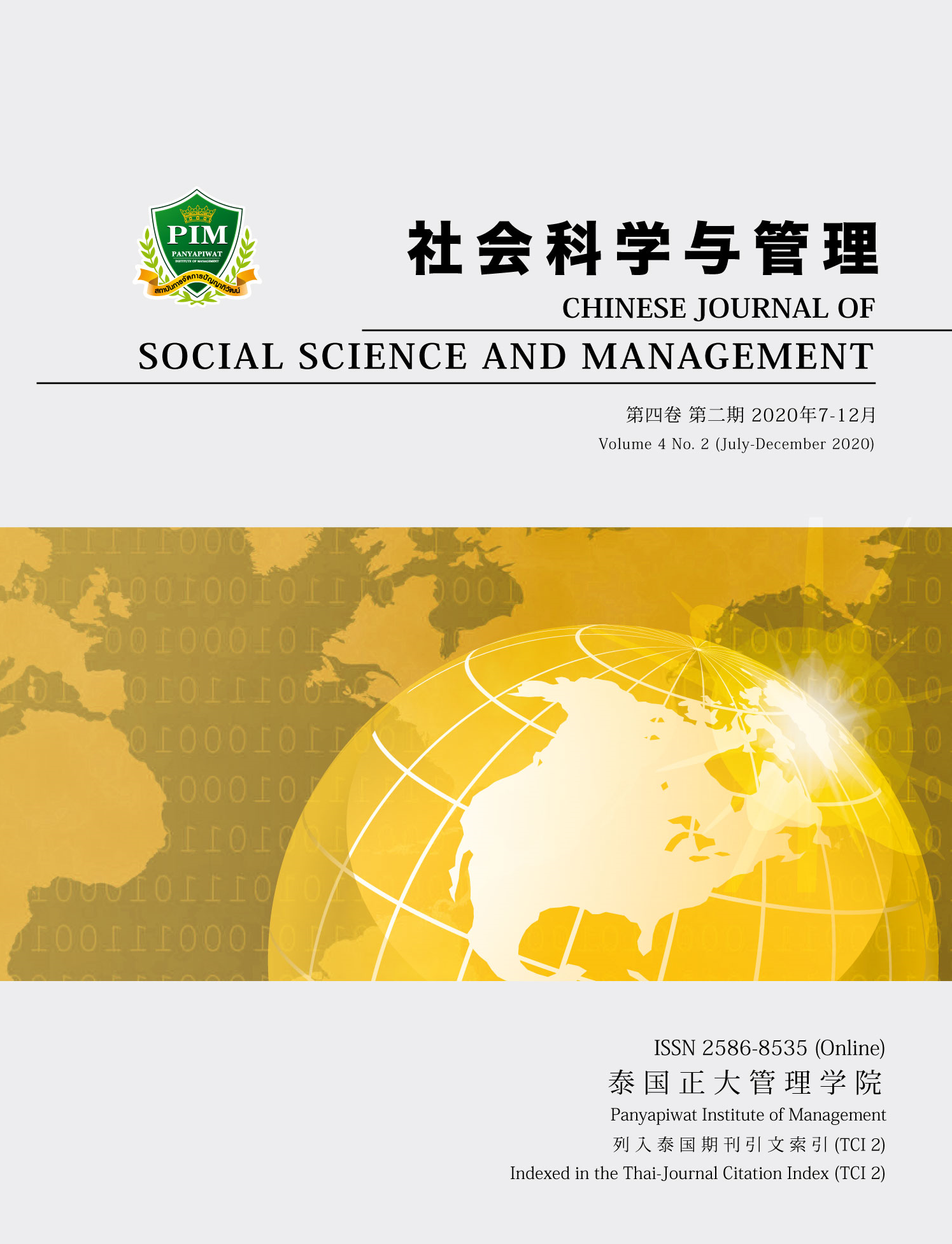THE EFFECT OF BEHAVIORAL CULTURAL INTELLIGENCE, PERSONALITY, AND ACADEMIC PERFORMANCE ON PERCEIVED WELL-BEING AMONG INTERNATIONAL CHINESE COLLEGE STUDENTS IN THAILAND
Main Article Content
Abstract
Globalization and increased economic interdependence have correlation. “Culture intelligence” and “Well-being” are increasingly valued by multinational companies as well as educational institutions. Nowadays, international programs are proliferating at universities throughout Thailand. This paper analyzed the factors of subjective Well-being for International Chinese College Students, including the relationship between cultural intelligence, NEO personality inventory and subjective Well-being. The participants included 264 International Chinese College Students (ICCS) who were enrolled in two Thai universities. This paper resulted in several findings: behavioral cultural intelligence has significant effects on SWB, while motivational cultural intelligence has no significant effects on SWB. Openness to experience has a positive impact on SWB, while neuroticism has a negative impact on SWB. Besides, ICCSs exhibited higher academic performance, meaning they received higher scores for SWB. Moreover, the older ICCSs received higher SWB scores. These findings add to the debate about cultural intelligence and how it may negatively impact subjective well-being. This paper concluded which factors most significantly affected ICCS’s SWB. The results of this research can be used for university reference in the future.
Article Details
Chinese Journal of Social Science and Management Editorial Division
The Office of Research and Development, Panyapiwat Institute of Management
85/1 Moo 2, Chaengwattana Rd., Bang Talat, Pakkred, Nonthaburi 11120, Thailand
Tel. 02 855 01048 E-mail: cjssm@pim.ac.th
References
Ang, S., Van Dyne, L., Koh, C. & Ng, K. Y. (2004). The measurement of cultural intelligence. Paper presented at the Annual Meeting of the Academy of Management, Symposium on Cultural Intelligence in the 21st Century. New Orleans, LA
Ang, S., Van Dyne, L., Koh, C., Ng, K. Y., Templer, K., Tay, C. & Chandrasekar, N. A. (2007). Cultural Intelligence: Its Measurement and Effects on Cultural Judgment and Decision Making, Cultural Adaptation and Task Performance. Management and Organization Review, 3(3), 335–371.
Chen, A. S, Lin, Y. C. & Hsu Y. H. (2011). The relationship of Behavioral Cultural Intelligence. Types of Conflict Management and Cross-cultural Adaptation, 14(2), 1-25 [in Chinese]
Costa, T. & McCrae, R. R. P. (1992). Normal personality assessment in clinical practice: The NEO Personality Inventory. Psychological Assessment, 4(1), 5-13.
Diener, E. (2000). Subjective well-being: The science of happiness and a proposal for a national index. American Psychologist, 55(1), 34-43.
Earley, C. & Ang, S. (2003). Cultural intelligence: Individual interactions across cultures. Palo Alto, Calif: Stanford University Press.
Furnham, A. & Petrides, K. V. (2003). Trait Emotional Intelligence And Happiness. Social Behavior and Personality: an international journal, 31(9), 815-823.
Ghonsooly, B. & Shalchy, Sh. (2013). Cultural intelligence and writing ability: delving into fluency, accuracy and complexity. Research on Youth and Language, 7(2), 147-159
Kirkpatrick, B. L . (2015). Personality and Happiness. Undergraduate Honor, 30, 429-432.
Lepp, A., Barkley, J. E. & Karpinski, A. C. (2014). The relationship between cell phone use, academic performance, anxiety, and Satisfaction with Life in college students. Computers in Human Behavior, (31), 343-350.
McCrae, R. R. & Costa, P. T. JR. (1985). Comparison of EPI and psychoticism scales with measures of the five-factor model of personality. Personality and Individual Differences, 6(5), 587-597.
Ministry of Education. (2019). Chinese students study abroad statistics in 2018. Retrieved March 27, 2019, from http://www.moe.gov.cn/jyb_xwfb/gzdt_gzdt/s5987/201903/t20190327_375704.html [in Chinese]
Pervin, C. D. & John, O. P. A. (2005). Personality: theory and research. New York: John Wiley & Sons, Inc.
Saucier, G. (1994). Mini-Markers: A brief version of Goldberg’s unipolar Big-Five markers. Journal of Personality Assessment, 63(3), 506-516.
Schmidt, F. L. & Hunter, J. E. (2000). Select on intelligence. In E. A. Locke (Ed.), Handbook of principles of organizational behavior. Oxford: UK: Blackwell.
Shen, S. H. & Chen I. H. (2017). A study on the relationship between cross-cultural adaptation and psychological well-being of Chinese students in Thailand. Education & Teaching Forum Periodicals Agency, 19, 82-86. [in Chinese]
Shin, D. C. & Johnson, D. M. (1978). Avowed happiness as an overall assement of the quality life. Social Indicators Research, 5, 475-492.
Wang, H. Y. (2017). Annual Report on the Development of Chinese Studying Abroad. China: Social Sciences Academic Press.
Ye, X. Y. (2010). Study on the relationship between college students’ subjective well-being and personality traits. Science of Social Psychology, 25(4), 439.


